Tübingen Core Group
-
Oliver Bringmann (Professor)
 Oliver Bringmann is directing the Chair for Embedded Systems and is serving as deputy head of the department of computer science. He studied computer science at the University of Karlsruhe (KIT) and received his PhD in computer science from the University of Tübingen in 2001. Until April 2012, he was division manager of the research division Intelligent Systems and Production Engineering (ISPE) and member of the management board at FZI Karlsruhe. His research activities are in the area of design electronic design automation (EDA), embedded system design, performance, power and thermal analysis, embedded many-core architectures, safety and security architectures, verification of embedded systems, as well as technology projection and architectural design – from system-level to tape-out.
Oliver Bringmann is directing the Chair for Embedded Systems and is serving as deputy head of the department of computer science. He studied computer science at the University of Karlsruhe (KIT) and received his PhD in computer science from the University of Tübingen in 2001. Until April 2012, he was division manager of the research division Intelligent Systems and Production Engineering (ISPE) and member of the management board at FZI Karlsruhe. His research activities are in the area of design electronic design automation (EDA), embedded system design, performance, power and thermal analysis, embedded many-core architectures, safety and security architectures, verification of embedded systems, as well as technology projection and architectural design – from system-level to tape-out. - Enkelejda Kasneci (Professor)
 Enkelejda Kasneci is a Professor of Computer Science at the University of Tübingen, Germany, where she leads the Perception Engineering Group. As a BOSCH-scholar, she received her M.Sc. degree in Computer Science from the University of Stuttgart in 2007. In 2013, she received her PhD in Computer Science from the University of Tübingen, Germany. For her PhD research, she was awarded the research prize of the Federation Südwestmetall in 2014. From 2013 to 2015, she was a Margarete-von-Wrangell Fellow. Dr. Kasneci’s overarching and long-term vision aims at computing systems that sense and infer the user’s cognitive state, actions, and intentions based on eye movements. These systems set out to provide information for assistive technologies applicable for many activities of everyday life. Towards this vision, her research combines eye tracking technology with machine learning in various multidisciplinary projects that are supported by national scientific societies as well as various industrial sources. In addition, she serves as academic for PlosOne as well as a reviewer and PC member for several journals and major conferences.
Enkelejda Kasneci is a Professor of Computer Science at the University of Tübingen, Germany, where she leads the Perception Engineering Group. As a BOSCH-scholar, she received her M.Sc. degree in Computer Science from the University of Stuttgart in 2007. In 2013, she received her PhD in Computer Science from the University of Tübingen, Germany. For her PhD research, she was awarded the research prize of the Federation Südwestmetall in 2014. From 2013 to 2015, she was a Margarete-von-Wrangell Fellow. Dr. Kasneci’s overarching and long-term vision aims at computing systems that sense and infer the user’s cognitive state, actions, and intentions based on eye movements. These systems set out to provide information for assistive technologies applicable for many activities of everyday life. Towards this vision, her research combines eye tracking technology with machine learning in various multidisciplinary projects that are supported by national scientific societies as well as various industrial sources. In addition, she serves as academic for PlosOne as well as a reviewer and PC member for several journals and major conferences. - Gjergji Kasneci (Professor)
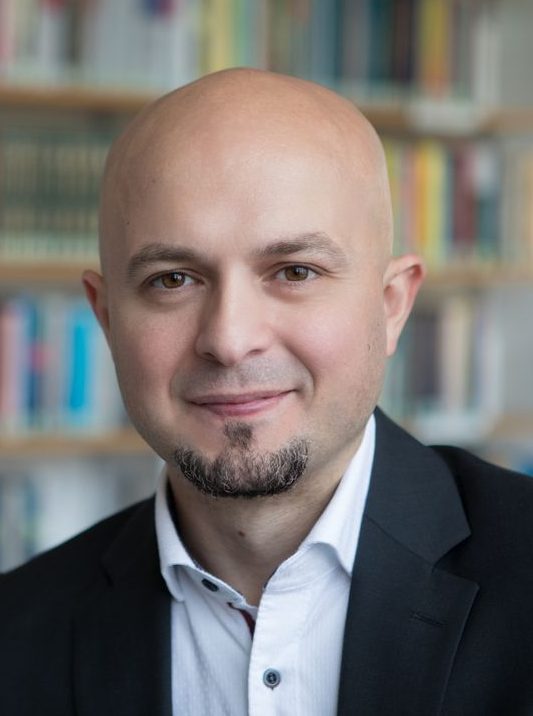 After completing his PhD in Graph-based Mining and Retrieval at the Max Planck Institute for Computer Science in Saarbrücken, Germany, in 2009, Dr. Kasneci joined Microsoft Research in Cambridge, UK, as a postdoctoral researcher, where he worked on probabilistic inference in knowledge bases. In 2011, he joined the Hasso Plattner Institute in Potsdam, Germany, where he lead the Web Mining and Analytics Research Group. Mid 2014, he joined the SCHUFA Holding AG, where he currently holds the CTO position. Since April 2018, he has also been leading the Data Science and Analytics Research Group at the University of Tübingen. His research interests include feature engineering, predictive modeling and quality assessment of training datasets.
After completing his PhD in Graph-based Mining and Retrieval at the Max Planck Institute for Computer Science in Saarbrücken, Germany, in 2009, Dr. Kasneci joined Microsoft Research in Cambridge, UK, as a postdoctoral researcher, where he worked on probabilistic inference in knowledge bases. In 2011, he joined the Hasso Plattner Institute in Potsdam, Germany, where he lead the Web Mining and Analytics Research Group. Mid 2014, he joined the SCHUFA Holding AG, where he currently holds the CTO position. Since April 2018, he has also been leading the Data Science and Analytics Research Group at the University of Tübingen. His research interests include feature engineering, predictive modeling and quality assessment of training datasets. - Thomas Kübler (PostDoc)
 Thomas Kübler is a post-doctoral researcher at the Perception Group of the University of Tübingen. He received his B.Sc. and M.Sc. degrees in Bioinformatics from the University of Tübingen in 2010 and 2012 respectively. In 2017, he received his PhD from the University of Tübingen where he worked on algorithms for the comparison of visual scan patterns. During his PhD, he worked as a research assistant at the University of Tübingen and the University of Aalen. In 2017, he received the Innovation Grant Life Sciences from the University of Tübingen in order to make the methods developed in his dissertation economically viable. Since 2018, his project ‘Look’ has been part of the M.Tech Accelerator Stuttgart. Dr. Kübler also gives regular lectures and talks especially for the automotive industry.
Thomas Kübler is a post-doctoral researcher at the Perception Group of the University of Tübingen. He received his B.Sc. and M.Sc. degrees in Bioinformatics from the University of Tübingen in 2010 and 2012 respectively. In 2017, he received his PhD from the University of Tübingen where he worked on algorithms for the comparison of visual scan patterns. During his PhD, he worked as a research assistant at the University of Tübingen and the University of Aalen. In 2017, he received the Innovation Grant Life Sciences from the University of Tübingen in order to make the methods developed in his dissertation economically viable. Since 2018, his project ‘Look’ has been part of the M.Tech Accelerator Stuttgart. Dr. Kübler also gives regular lectures and talks especially for the automotive industry. - Efe Bozkir (PhD Student)
 Efe Bozkir is a PhD Candidate at the Perception Engineering Group of the University of Tübingen. He received his B.Sc. degree in Computer Engineering in 2014 from Istanbul Technical University with honors. In 2016, he received his M.Sc. degree in Computer Science from the Technical University of Munich with distinction concentrating on computer vision, graphics, artificial intelligence and robotics. During his studies, he held several scholarships. In addition to his academic background, he has a demonstrated history of working in finance, insurance, media and semiconductor industries as a full-stack IT Consultant and software developer. Currently as a second-year PhD student, his research interests include augmented/virtual reality, privacy preserving eye tracking, machine learning and robotics.
Efe Bozkir is a PhD Candidate at the Perception Engineering Group of the University of Tübingen. He received his B.Sc. degree in Computer Engineering in 2014 from Istanbul Technical University with honors. In 2016, he received his M.Sc. degree in Computer Science from the Technical University of Munich with distinction concentrating on computer vision, graphics, artificial intelligence and robotics. During his studies, he held several scholarships. In addition to his academic background, he has a demonstrated history of working in finance, insurance, media and semiconductor industries as a full-stack IT Consultant and software developer. Currently as a second-year PhD student, his research interests include augmented/virtual reality, privacy preserving eye tracking, machine learning and robotics. - Konstantin Lübeck (PhD Student)
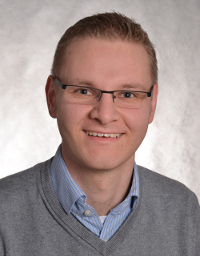 Konstantin Lübeck is a PhD Candidate at the Chair for Embedded Systems of the University of Tübingen. He received B.Sc. and M.Sc. degrees in Computer Science from the University of Tübingen in 2015 and 2018 respectively with a major focus on computer engineering and embedded systems. In 2016, he studied at the Uppsala University as an Erasmus exchange student. In 2017, he received a scholarship for master’s thesis from the Stiftung Industrieforschung. Since 2018, he is a lecturer of computer architecture for the Bosch Learning Company initiative at the technology transfer center Tübingen. In addition to his academic work, he is a trained mechatronics technician (certified by the German chamber of industry and commerce, IHK) and worked as a self-employed software developer. His research interests are performance prediction and modeling of software-intensive hardware systems, heterogeneous multi-core architectures, and computer microarchitecture.
Konstantin Lübeck is a PhD Candidate at the Chair for Embedded Systems of the University of Tübingen. He received B.Sc. and M.Sc. degrees in Computer Science from the University of Tübingen in 2015 and 2018 respectively with a major focus on computer engineering and embedded systems. In 2016, he studied at the Uppsala University as an Erasmus exchange student. In 2017, he received a scholarship for master’s thesis from the Stiftung Industrieforschung. Since 2018, he is a lecturer of computer architecture for the Bosch Learning Company initiative at the technology transfer center Tübingen. In addition to his academic work, he is a trained mechatronics technician (certified by the German chamber of industry and commerce, IHK) and worked as a self-employed software developer. His research interests are performance prediction and modeling of software-intensive hardware systems, heterogeneous multi-core architectures, and computer microarchitecture. - Martin Pawelczyk (PhD Student)
 Martin Pawelczyk is a PhD candidate at the Data Science and Analytics Lab of the University of Tübingen. Prior to this, he obtained his M.Sc. in Statistics (Research) at the London School of Economics (LSE), where he focused on statistical learning. Before graduating from LSE, he studied Econometrics at the University of Edinburgh (M.Sc.) and Economics at the University of Cologne (B.Sc.). During his graduate studies, he was supported by the German National Merit Foundation. As a first year PhD student, his research interests include machine learning, fairness and explainability.
Martin Pawelczyk is a PhD candidate at the Data Science and Analytics Lab of the University of Tübingen. Prior to this, he obtained his M.Sc. in Statistics (Research) at the London School of Economics (LSE), where he focused on statistical learning. Before graduating from LSE, he studied Econometrics at the University of Edinburgh (M.Sc.) and Economics at the University of Cologne (B.Sc.). During his graduate studies, he was supported by the German National Merit Foundation. As a first year PhD student, his research interests include machine learning, fairness and explainability. - Yao Rong (PhD Student)
 Yao Rong is a PhD Candidate at the Perception Engineering Group of the University of Tübingen. She received her B.Eng. degree in Mechatronics in 2016 from Tongji University, China. In 2019, she received her M.Sc. degree in Electrical and Computer Engineering from the Technical University of Munich with distinction concentrating on computer vision, machine learning and dynamic systems. As a first year PhD student, her research interests include computer vision, machine learning, robotics and system-on-chip technologies.
Yao Rong is a PhD Candidate at the Perception Engineering Group of the University of Tübingen. She received her B.Eng. degree in Mechatronics in 2016 from Tongji University, China. In 2019, she received her M.Sc. degree in Electrical and Computer Engineering from the Technical University of Munich with distinction concentrating on computer vision, machine learning and dynamic systems. As a first year PhD student, her research interests include computer vision, machine learning, robotics and system-on-chip technologies.
Patras Core Group
- Athanassios Skodras (Professor)
 Athanassios Skodras is the Professor of Digital Systems and Director of the Digital Signal and Image Processing Lab of the Department of Electrical and Computer Engineering of the University of Patras (UoP), Greece. He holds a Physics degree from Aristotle University of Thessaloniki, Greece (1980), a Computer Engineering & Informatics degree and a PhD degree in Electronics from the University of Patras, Greece (1986). He has been Professor, Head of Computer Science and founder/director of the Digital Systems & Media Computing Lab, School of Science and Technology, Hellenic Open University (HOU), Greece; served as Dean (2010-2013) and Deputy Dean (2004-2006) of the School of Science and Technology, HOU. From 1986 to 2002 he has been holding teaching and research positions at the Departments of Physics and Computer Engineering & Informatics, UoP, while he has spent the academic years 1988-89 and 1996-97 at the Department of Electrical and Electronic Engineering, Imperial College London, UK. His research interests include Gesture Recognition Based on sEMG Signals and Deep Learning, Discrimination of Photos from Computer Graphics Images, ENF-based Authentication of Digital Media, Satellite Image Registration, Vehicle Recognition, Image and Video Coding, Brown Adipose Tissue Quantification from Thermal Images, HDR Image Compression, NIR Finger Vein Authentication, digital watermarking, fast transform algorithms (theory and implementation). He has published over 160 publications in refereed journals and conference proceedings, authored or co-authored 6 books, 4 book chapters, and holds 2 international patents filed by Ericsson, Sweden. He is the co-recipient of the first place Chester Sall Award for the best paper in the 2000 IEEE Transactions on Consumer Electronics, regarding the JPEG 2000 still image compression
standard. Professor Skodras has served as Associate/Area Editor for the Springer Journal of Real-Time Image Processing, the Elsevier Signal Processing Image communication and the EURASIP Journal on Image and Video Processing, and serves as a General Chair / Technical Committee Member / Reviewer for numerous journals and conferences. He is a Chartered Engineer, Senior Member of the IEEE, and member of the EURASIP and the Technical Chamber of Greece.
Athanassios Skodras is the Professor of Digital Systems and Director of the Digital Signal and Image Processing Lab of the Department of Electrical and Computer Engineering of the University of Patras (UoP), Greece. He holds a Physics degree from Aristotle University of Thessaloniki, Greece (1980), a Computer Engineering & Informatics degree and a PhD degree in Electronics from the University of Patras, Greece (1986). He has been Professor, Head of Computer Science and founder/director of the Digital Systems & Media Computing Lab, School of Science and Technology, Hellenic Open University (HOU), Greece; served as Dean (2010-2013) and Deputy Dean (2004-2006) of the School of Science and Technology, HOU. From 1986 to 2002 he has been holding teaching and research positions at the Departments of Physics and Computer Engineering & Informatics, UoP, while he has spent the academic years 1988-89 and 1996-97 at the Department of Electrical and Electronic Engineering, Imperial College London, UK. His research interests include Gesture Recognition Based on sEMG Signals and Deep Learning, Discrimination of Photos from Computer Graphics Images, ENF-based Authentication of Digital Media, Satellite Image Registration, Vehicle Recognition, Image and Video Coding, Brown Adipose Tissue Quantification from Thermal Images, HDR Image Compression, NIR Finger Vein Authentication, digital watermarking, fast transform algorithms (theory and implementation). He has published over 160 publications in refereed journals and conference proceedings, authored or co-authored 6 books, 4 book chapters, and holds 2 international patents filed by Ericsson, Sweden. He is the co-recipient of the first place Chester Sall Award for the best paper in the 2000 IEEE Transactions on Consumer Electronics, regarding the JPEG 2000 still image compression
standard. Professor Skodras has served as Associate/Area Editor for the Springer Journal of Real-Time Image Processing, the Elsevier Signal Processing Image communication and the EURASIP Journal on Image and Video Processing, and serves as a General Chair / Technical Committee Member / Reviewer for numerous journals and conferences. He is a Chartered Engineer, Senior Member of the IEEE, and member of the EURASIP and the Technical Chamber of Greece. - Konstantinos Moustakas (Associate Professor)
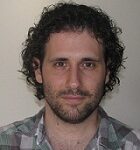 Konstantinos Moustakas received the Diploma degree and the PhD in electrical and computer engineering from the Aristotle University of Thessaloniki, Greece, in 2003 and 2007 respectively. During 2007-2011 he served as a post-doctoral research fellow in the Information Technologies Institute, Centre for Research and Technology Hellas. He is currently an Associate Professor in the Electrical and Computer Engineering Department of the University of Patras, Head of the Visualization and Virtual Reality Group, Director of the Wire Communications Laboratory and Director of the MSc Program on Biomedical Engineering of the University of Patras. His main research interests include virtual, augmented and mixed reality, 3D geometry processing, haptics, virtual physiological human modeling, information visualization, physics-based simulations, computational geometry and 3D computer vision. During the latest years, he has been the (co)author of more than 170 papers in refereed journals, edited books, and international conferences. His research work has received several awards. He serves as a regular reviewer for several technical journals and has participated in more than 20 research and development projects funded by the EC and the Greek Secretariat of Research and Technology. He is/was the coordinator of the GameCar H2020 project, scientific coordinator of the NoTremor FP7 project, while he also chairs the scientific board of the FrailSafe H2020 project. He has also been a member of the organizing committee of several international conferences. He is a senior member of the IEEE, the IEEE Computer Society and member of Eurographics.
Konstantinos Moustakas received the Diploma degree and the PhD in electrical and computer engineering from the Aristotle University of Thessaloniki, Greece, in 2003 and 2007 respectively. During 2007-2011 he served as a post-doctoral research fellow in the Information Technologies Institute, Centre for Research and Technology Hellas. He is currently an Associate Professor in the Electrical and Computer Engineering Department of the University of Patras, Head of the Visualization and Virtual Reality Group, Director of the Wire Communications Laboratory and Director of the MSc Program on Biomedical Engineering of the University of Patras. His main research interests include virtual, augmented and mixed reality, 3D geometry processing, haptics, virtual physiological human modeling, information visualization, physics-based simulations, computational geometry and 3D computer vision. During the latest years, he has been the (co)author of more than 170 papers in refereed journals, edited books, and international conferences. His research work has received several awards. He serves as a regular reviewer for several technical journals and has participated in more than 20 research and development projects funded by the EC and the Greek Secretariat of Research and Technology. He is/was the coordinator of the GameCar H2020 project, scientific coordinator of the NoTremor FP7 project, while he also chairs the scientific board of the FrailSafe H2020 project. He has also been a member of the organizing committee of several international conferences. He is a senior member of the IEEE, the IEEE Computer Society and member of Eurographics. - Kyriakos Sgarbas (Associate Professor)
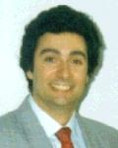 Dr Kyriakos Sgarbas was born in Athens, Greece, in 1966. He holds a Diploma of Electrical Engineering (1989) and a PhD in Artificial Intelligence (1997), both from the Department of Electrical and Computer Engineering, University of Patras, Greece. He has also completed postgraduate studies (2003) in Open and Distance Learning /Adult Education at the Hellenic Open University. His professional activities (since 1990) include work both in the private and the public sector as an electrical engineer, computer programmer, researcher and educator. In 2004 he was elected as a faculty member at the Department of Electrical and Computer Engineering, University of Patras, where he still serves as an Associate Professor with the scientific subject “Classical and Quantum Artificial Intelligence”. Since 2001 he also teaches as a distance-learning instructor at the School of Science and Technology of the Hellenic Open University. His research interests include Algorithms and Data Structures, Artificial Intelligence, Computational Linguistics, Natural Language Processing, Machine Learning, Quantum Computing, Quantum Information Processing, Medical Informatics, Bioinformatics, and Education. He has published more than 100 scientific papers in international conferences and journals (h-index 14 in Google Scholar), with three distinctions. He has participated in more than 20 research projects. For more than 20 years he has been teaching classes in several subjects, including Computer Programming, Artificial Intelligence, Machine Learning, Digital Logic, Computational Linguistics, Expert Systems, Natural Language Processing, and Quantum Information Processing, both in undergraduate and postgraduate level. Some of his classes (Introduction to Computers, Artificial Intelligence I & II, Quantum Information Processing) have become available online as open video-courses. He has supervised more than 100 graduate and diploma theses and 8 PhD dissertations (three of them completed). He has served as a Programm and Organizing Committee Member in several scientific conferences, as a reviewer in numerous international journals, as a reviewer of research proposals for the Hellenic Ministry of Education, as an Elected Member of the Executive Board of the Hellenic Artificial Intelligence Society (twice, 2003-04 and 2005-06), and as a Member of the University of Patras Senate (2009-10). He is a member of ACM, EETN, TEE, and Senior Member of IEEE.
Dr Kyriakos Sgarbas was born in Athens, Greece, in 1966. He holds a Diploma of Electrical Engineering (1989) and a PhD in Artificial Intelligence (1997), both from the Department of Electrical and Computer Engineering, University of Patras, Greece. He has also completed postgraduate studies (2003) in Open and Distance Learning /Adult Education at the Hellenic Open University. His professional activities (since 1990) include work both in the private and the public sector as an electrical engineer, computer programmer, researcher and educator. In 2004 he was elected as a faculty member at the Department of Electrical and Computer Engineering, University of Patras, where he still serves as an Associate Professor with the scientific subject “Classical and Quantum Artificial Intelligence”. Since 2001 he also teaches as a distance-learning instructor at the School of Science and Technology of the Hellenic Open University. His research interests include Algorithms and Data Structures, Artificial Intelligence, Computational Linguistics, Natural Language Processing, Machine Learning, Quantum Computing, Quantum Information Processing, Medical Informatics, Bioinformatics, and Education. He has published more than 100 scientific papers in international conferences and journals (h-index 14 in Google Scholar), with three distinctions. He has participated in more than 20 research projects. For more than 20 years he has been teaching classes in several subjects, including Computer Programming, Artificial Intelligence, Machine Learning, Digital Logic, Computational Linguistics, Expert Systems, Natural Language Processing, and Quantum Information Processing, both in undergraduate and postgraduate level. Some of his classes (Introduction to Computers, Artificial Intelligence I & II, Quantum Information Processing) have become available online as open video-courses. He has supervised more than 100 graduate and diploma theses and 8 PhD dissertations (three of them completed). He has served as a Programm and Organizing Committee Member in several scientific conferences, as a reviewer in numerous international journals, as a reviewer of research proposals for the Hellenic Ministry of Education, as an Elected Member of the Executive Board of the Hellenic Artificial Intelligence Society (twice, 2003-04 and 2005-06), and as a Member of the University of Patras Senate (2009-10). He is a member of ACM, EETN, TEE, and Senior Member of IEEE. - Dimitris Ampeliotis (PostDoc)
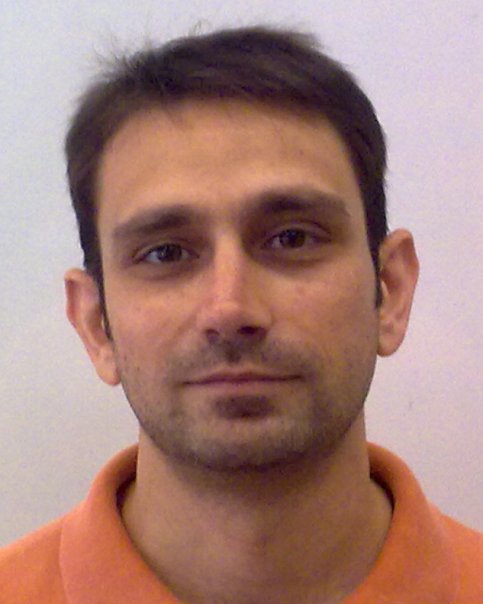 Dimitris Ampeliotis is a post-doc researcher at the University of Patras. He received the Diploma degree in computer engineering and informatics in 2002, the M.Sc. degree in signal and image processing systems in 2004, and the Ph.D. degree in signal processing in 2009, all from the University of Patras. He has worked for many years as an adjunct professor at the University of Patras and at the Technological Educational Institute of Western Greece. Also, he has participated in various national and EU funded research and development projects. His research interests include distributed signal processing and learning algorithms, digital image processing and signal processing for communications. Dr. Ampeliotis is a member of the IEEE, a member of EURASIP and a member of the technical chamber of Greece.
Dimitris Ampeliotis is a post-doc researcher at the University of Patras. He received the Diploma degree in computer engineering and informatics in 2002, the M.Sc. degree in signal and image processing systems in 2004, and the Ph.D. degree in signal processing in 2009, all from the University of Patras. He has worked for many years as an adjunct professor at the University of Patras and at the Technological Educational Institute of Western Greece. Also, he has participated in various national and EU funded research and development projects. His research interests include distributed signal processing and learning algorithms, digital image processing and signal processing for communications. Dr. Ampeliotis is a member of the IEEE, a member of EURASIP and a member of the technical chamber of Greece. - Vassilis Fotopoulos (PostDoc)Vassilis Fotopoulos graduated from the University of Patras, Department of Physics in 1995 and he received his MSc degree from the Electronics Laboratory of the same department in 1998. He received his PhD in 2003 from Patras University as well. He teaches digital logic design at the Hellenic Open University (Dept. of Computer Science) and his research interests include digital watermarking, digital image and video processing, microcontrollers and arduino, image and video compression algorithms. He is currently a member of the Signal Processing and Computer societies of the IEEE. He has served as reviewer for IEE’s Electronic Letters, IEEE’s Transactions on Circuits and Systems for Video Technology, Signal Processing Letters, Signal Image and Video Processing (Springer), SPIE’s Journal of Optical Engineering, Journal of Electronic Imaging, International Journal of Computer Mathematics (Taylor & Francis) and other peer-reviewed journals and for the ICIP, ICPR and EUSIPCO conferences. He has published 50 works in various international conferences and journals.
- Panagiotis Tsinganos (PhD Student)
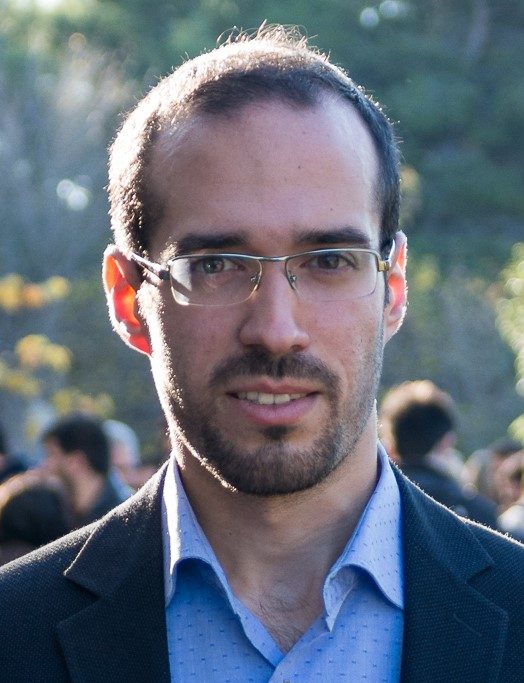 Panagiotis Tsinganos is a PhD Candidate at the Department of Electrical and Computer Engineering, University of Patras, Greece. He received his first degree Diploma in 2015 from the Department of Electrical and Computer Engineering. In his MSc degree in Biomedical Engineering at the University of Patras, from which he graduated with honors in 2017, he studied the problem of fall detection with wearable devices. Currently, in his second year as a PhD Candidate, he is pursuing research on gesture recognition based on electromyography using Deep Learning methods. His research interests include signal/image processing, machine learning and data mining as well as embedded systems programming.
Panagiotis Tsinganos is a PhD Candidate at the Department of Electrical and Computer Engineering, University of Patras, Greece. He received his first degree Diploma in 2015 from the Department of Electrical and Computer Engineering. In his MSc degree in Biomedical Engineering at the University of Patras, from which he graduated with honors in 2017, he studied the problem of fall detection with wearable devices. Currently, in his second year as a PhD Candidate, he is pursuing research on gesture recognition based on electromyography using Deep Learning methods. His research interests include signal/image processing, machine learning and data mining as well as embedded systems programming.
